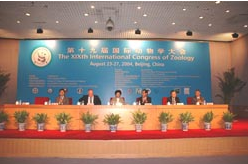Home > INTERNATIONAL CONGRESSES > ISIZ > Integrative Zoology Held
On April 26, 2021, the International Society of Zoology (ISZS) and the International Union of Biological Sciences (IUBS) jointly held the 1st Virtual Symposium of Zoonotic Diseases and the 12th International Symposium of Integrated Zoology, ISZS. The conference was conducted online on Zoom. The purpose of this conference was to promote academic exchange in studies on zoonotic diseases by scientists from different disciplines, and to reveal the laws and dynamics of the spread of major zoonotic diseases that pose a high threat to humans.
Prof. Zhang Zhibin, President of the International Society of Zoological Sciences (ISZS), chaired the meeting. He firstly introduced the background, tasks and progress of the IUBS Zoonotic Disease Working Group. The working group was established by IUBS in 2020, with collaboration of ISZS, aiming to focus on promoting studies on zoonotic disease as to the impact of climate change and human activities on prevalence of zoonotic diseases. The tasks include: organizing one or two special issues on zoonotic diseases to be published in internationally renowned journals (including Integrative Zoology), holding 2-3 symposia on zoonotic diseases, holding training courses (20-30 students each), and conducting one or two field trips. The President of IUBS, Professor LS Shashidhara of the Indian Institute of Science Education, delivered the opening speech for the meeting. He said that in the modern era of the new century, we are facing more challenges from zoonotic diseases, such as SARS, COVID-19, MERS, Zika, Ebola, plague, dengue fever, swine fever, influenza, etc., a large proportion of zoonotic viruses are known to be carried by birds, rodents, bats, primates and carnivores. Therefore, IUBS decided to establish a working group and an international scientific plan on zoonotic diseases, inviting scientists and experts from all over the world to conduct joint research and discuss countermeasures. Prof. LS Shashidhara was very grateful to ISZS for co-organizing this meeting with IUBS under this situation, which is also the focus of IUBS' annual work.
Screenshot of Virtual Symposium with presenters
The virtual symposium invited four internationally renowned experts to give reports, demonstrating the most cutting-edge research directions, progress and results in related fields. Professor Jason Rohr from the University of Notre Dame in the United States gave a report entitled "Human health and sustainable win-win achieved by the control of zoonotic worms", introducing the huge damage caused by schistosomiasis and other helminthous diseases in the world, especially in African countries, and the countering measures. The report pointed out that more than 1.5 billion people in the developing countries are currently infected with worms, and 75% of deaths are related to infectious diseases. After the human body is infected with worms, it will consume huge amounts of extra nutrients and energy, and may cause body deformation, while children will affect growth and even lead to developmental stagnation after infection. Eliminating worms and using chemicals to prevent infection require a significant amount of drug and management work, and these measures are difficult to achieve in developing countries. Research by Jason Rohr's team has shown that it is possible to use sustainable methods that are beneficial to local residents to reduce worm infections based on the life history of infectious worms. For example, removing the submerged vegetation can reduce the host, thereby reducing the reinfection rate of human schistosomiasis. He further called for the hope that through finding and realizing win-win interventions on health, food, water, energy and the environment, to strengthen and accelerate the sustainable development of Africa, and to help countries who need the most help assistance.
Professor Serge Morand from the University of Montpellier in France gave a report entitled "Wild Animal-borne Diseases and Biodiversity, Livestock and Humans", introducing the origin of infectious diseases, the development of animal husbandry, ecosystem change, and biodiversity. The talk also summarized loss of life associated with disease transmission and spillovers, and the status quo of the relationship between livestock and wild animals. The report pointed out that the rapid changes in the ecosystem, agricultural civilization and animal domestication have increased the spread of animal diseases. Loss of biodiversity, loss of balance in ecosystems, and global climate change are also closely related to human health. The BiodivHealthSea and FutureHealthSEA projects are the responsible organizations in Southeast Asia that focus on how to prevent the occurrence and spread of zoonotic diseases, and continue to strive forward toward finding corresponding solutions to get out of the crises.
Professor Chengjun Li from the Harbin Institute of Veterinary Medicine of the Chinese Academy of Agricultural Sciences introduced his important progress in the study of the effect of Susuylation modification on the pathogenicity and transmission mechanism of influenza virus. The study found that the influenza virus PB1 protein was modified by SUMO1 in both transfected and infected cells. Among them, the lysine 612 (K612) located in the C-terminal vRNA binding region of the PB1 protein is the key site for threonination modification. Large-scale sequence analysis found that PB1/K612 residues are highly conserved among different subtypes of influenza virus strains, indicating that the susuylation modification of PB1/K612 locus is a highly conserved mechanism of influenza virus protein post-translational modification. The study further explored the effect of PB1/K612 sites on the replication of influenza virus. It was found that the influenza viruses formed by the PB1/K612R mutant virus defective in PB1/K612 were significantly reduced when cultured in MDCK cells, and the growth titer was significantly reduced. In vivo studies in animals have found that compared with wild-type viruses, the replication titer and pathogenicity of the PB1/K612R mutant virus deficient in Susuylation modification in mice are significantly reduced, and the ability to transmit respiratory droplets between ferrets is reduced . This study found for the first time the important effect of the Susuylation modification at the K612 site of the PB1 protein on the pathogenicity and transmission of influenza viruses. The related research results broadened our understanding of how the host’s post-translational modification system regulates the replication mechanism of influenza viruses. The research and development of influenza virus drugs provides a reference.
Professor Rodolfo Dirzo of Stanford University, an academician of the National Academy of Sciences of the USA, gave a report entitled "Biodiversity and zoonotic diseases". The report introduced the current changes in global biodiversity and pointed out that forest degradation and the decline of animal diversity in the world. There are huge challenges facing zoologists and conservationists, among them, the important feature of the decline in animal diversity is the decrease in large mammals, and the increase in diversity and number of small mammals. Further experimental studies have found that the decline in animal diversity has led to a significant increase in the diversity and number of pathogenic bacteria and parasites carried by small mammals, thereby increasing the risk of zoonotic diseases. Finally, he called for the restoration of biodiversity through measures such as preventing habitat loss, rational development, multidisciplinary collaboration, rebuilding animal communities and species interactions, and reducing the risk of zoonotic diseases at the source. The report provides new ideas and scientific recommendations for the risk control and prevention of global zoonotic diseases from the perspective of biodiversity.
A total of 96 representatives from 27 countries and regions, including Argentina, Australia, Bangladesh, Belgium, Brazil, Cambodia, China, Egypt, France, Georgia, Germany, India, Lithuania, Mexico, Mongolia, Mozambique, Norway, Pakistan, Russia, South Africa, Spain, Tanzania, Thailand, Uganda, United Kingdom, the United States, and Zambia, participated in this conference. This brought together many experts, scholars and technicians in China and abroad whom are engaged in the research and prevention and control of zoonotic diseases. After the seminars, the presenters had active discussions about their talks with the audience. Participants expressed their support for the successful holding of this conference, especially the active support given by relevant host units, partners and support units including the International Society of Zoological Sciences and the Institute of Zoology, Chinese Academy of Sciences, as well as the hard work of the staff, to which we express our heartfelt thanks. Participants said that the meeting provided an important platform for researchers to exchange academic ideas, share scientific research work, and reach cooperation. They look forward to Part II of the Symposium of Zoonotic Diseases and the next International Symposium of Integrative Zoology to be held online on 27 September 2021.
![]() Summary of 1st IUBS-ISZS Zoonotic Diseases Symposium.docx
Summary of 1st IUBS-ISZS Zoonotic Diseases Symposium.docx

